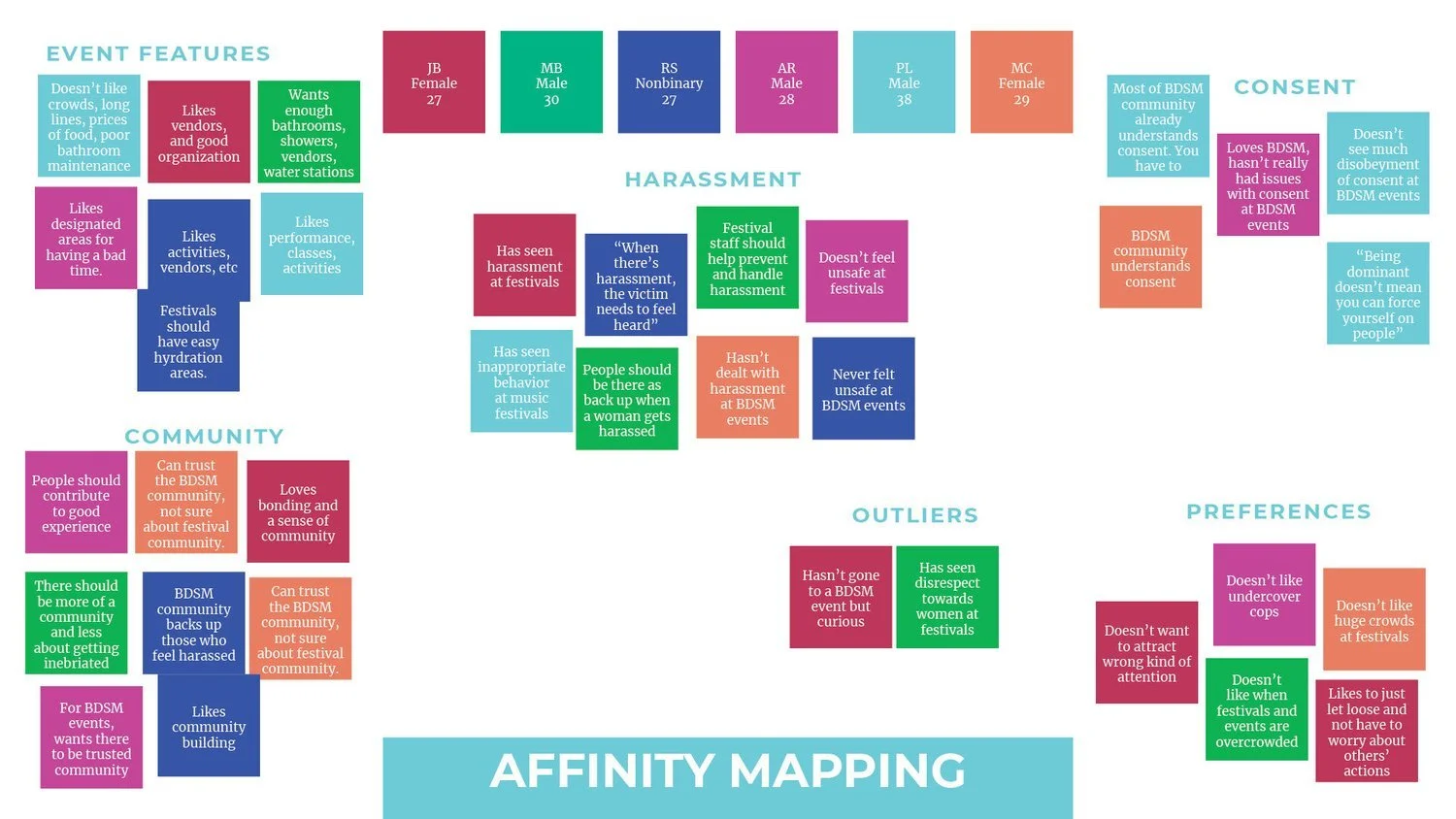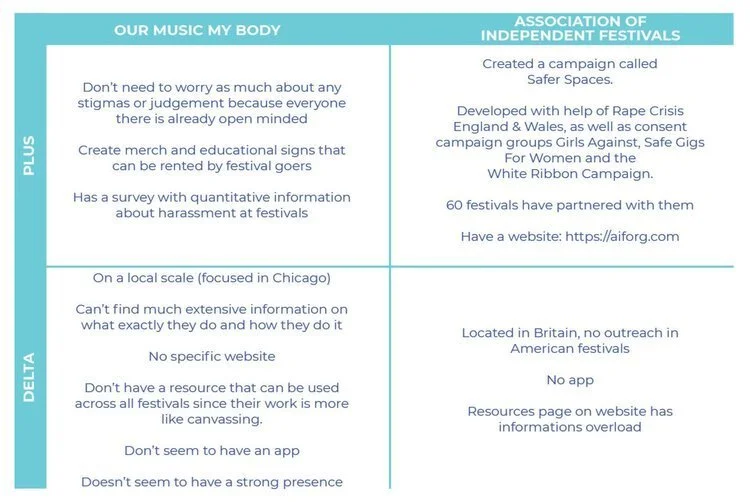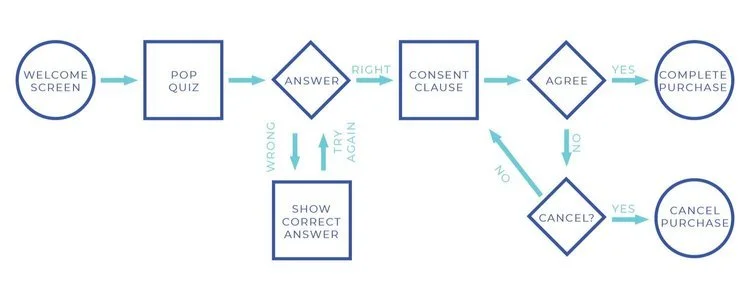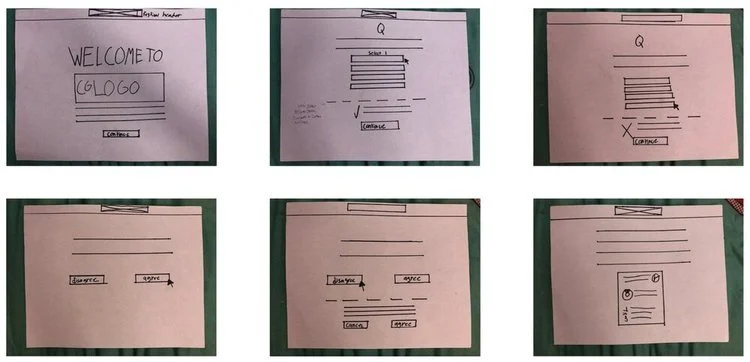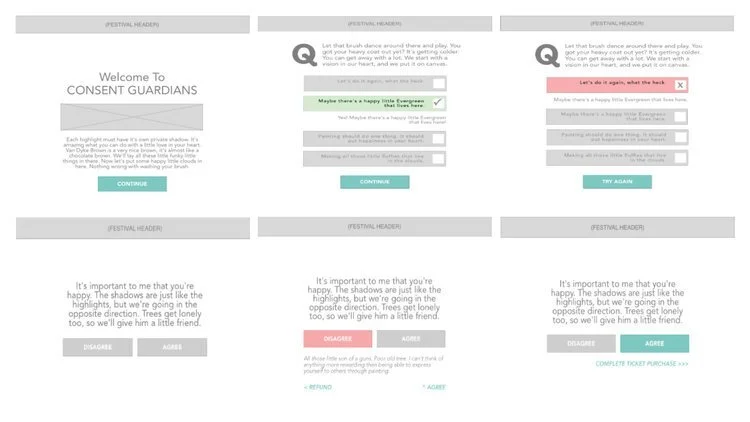Consent Guardians
Role
Lead UX Designer (solo)
Client
Concept Project
Duration
4 months
Platform
Web App
Goal
Create an API that festivals can plug into their checkout process so that festival goers MUST learn about consent before attending to combat harassment.
The Process
Note: This project was completed early in my UX journey using the traditional design thinking approach. For clarity and consistency across my portfolio, I’ve organized this case study using my current C.L.E.A.R. framework to help communicate process and outcomes more effectively.
Context
This project began as a UX student challenge: come up with a meaningful solution to a real problem. I pitched a provocative idea — a hybrid EDM and BDSM festival. The concept raised eyebrows, but I welcomed the friction.
I believe design should challenge what’s comfortable, especially when it comes to cultural blind spots.
The initial intention was to create a shared space for two communities that embrace freedom of expression, connection, and embodied experience.
But the deeper I got into user interviews and cultural analysis, the more the actual problem emerged.
Lens
I conducted interviews with six individuals — festival lovers, BDSM community members, or both. I also pulled research from OurMusicMyBody’s 2017 study of harassment at music events. Here’s what I discovered:
BDSM community members felt no need for a hybrid. They already felt safe in their events due to the built-in structure of consent, communication, and accountability.
EDM fans, however, expressed hesitation — not toward BDSM culture, but toward the lack of boundaries within EDM spaces.
Both groups did not trust the EDM festival community to uphold consent.
OurMusicMyBody Survey Data:
1,286
total reports of harassment at a music venue or festival.
60%
of music fans who identify as transgender experienced physical violence at events.
“The recent crowds don’t seem to realize you don’t get to touch someone just because they’re dressed a certain way. Consent is sexy.”
Pivot
Originally, I aimed to create a space for BDSM and EDM to coexist. But I realized I didn’t need to bring BDSM values into EDM culture through shared space — I needed to inject those values into the culture itself.
The problem wasn’t lack of events — it was lack of structure, safety, and education around consent at festivals.
92%
of female fans experienced harassment at festivals.
31%
of male music fans identifying as LGBTQ+ experienced both physical and non-physical harassment.
Explore
With the insight reframed, I redefined the goal:
How might we normalize consent in the festival community and provide tools for education, prevention, and real-time support?
Proposed Solution: A Four-Phase Rollout
Phase 1: Education
API plugin integrated into the ticket checkout flow
Users complete a 1-minute consent quiz
Must read and agree to a consent clause before purchase is finalized
Phase 2: Reinforcement
Victim-centered training for event staff
Clear protocol for handling harassment reports with empathy
Trained staff made visibly identifiable and easily accessible
Phase 3: Real-Time Tools (App)
Mobile app for use before, during, and after the event
Emergency Help button tied to geo-location
Wristband scanning to report users by ID
Login required via ticket registration to verify access and prevent misuse
Phase 4: Awareness & Culture Shift
Branded marketing campaign around “Consent Is Sexy”
Merchandise and digital assets to spread the message
Long-term social media strategy to create ongoing conversation
Usability Testing
Low-Fidelity Testing
Users didn’t understand the significance of the checkbox on the final screen
The quiz allowed unlimited guessing, which weakened knowledge retention
Mid-Fidelity Wireframes
Users clicked rapidly through quiz answers just to proceed
The sudden redirect to ticket confirmation caused momentary disorientation
Iterations
Revised the quiz: if a user selects the wrong answer, the correct one is shown immediately — reducing clicks and improving learning
Added a transition screen before the redirect to clarify what’s next
Improved copy hierarchy and visual cues for clarity
Align
Refine
Constraints
Technical:
API integration across multiple ticketing platforms
Native app development with real-time location tracking
Secure wristband scanning and reporting features
Business:
Potential resistance from event organizers who prioritize conversions
Risk that consent prompts in checkout could trigger drop-off
Financial:
Need for pre-revenue funding to build MVP
Monetization strategy (merch, partnerships) still in development
Design Ethics
Design always prioritized survivor safety over simplicity
Every feature included clear user education and data transparency
Focused on reducing harm, not just adding “awareness” content
Partner with developers to scope the Phase 1 MVP
Pitch to mission-aligned festival organizers
Collaborate with professionals in trauma-informed care to finalize training protocols
Expand marketing and social partnerships for broad cultural traction
Next Steps
User Interviewing & Affinity Mapping
Journey Mapping & User Flows
Low- and Mid-Fidelity Wireframes
Adobe XD
Figma
UX Writing & Content Hierarchy
Design Ethics & Inclusive Design Principles
Sole UX Designer
Research Lead
Strategy & Concept Development
Wireframing & Prototyping
Usability Testing
My Role
Tools & Skills
Consent Guardians started as a radical concept and became a strategic framework for real cultural change.
It’s more than a product. It’s a toolkit for shifting how the festival world talks about and enforces boundaries. It doesn’t stop bad behavior with a slogan. It designs structures that make good behavior the baseline.
This project taught me what true UX work is:
Listen to the people most affected, challenge your own assumptions, and design systems that do more than decorate a problem — they solve it.

